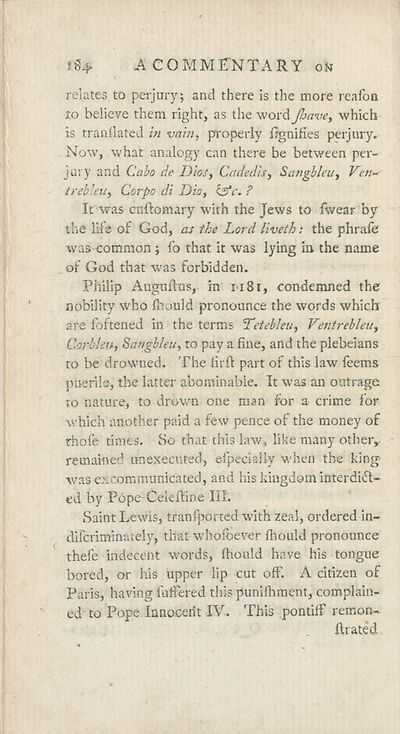Download files
Complete book:
Individual page:
Thumbnail gallery: Grid view | List view

A COMMENTARY ok
184.
relates to perjury; and there is the more reafon
to believe them right, as the word Jhave, which
is tranflated in vain, properly IfgniHes perjury.
Now, what analogy can there be between per¬
jury and Cabo de Dios, Cadedis, Sangblcu, Ven-
trebleu, Corpo di Dio, tsfc. ?
It was enftomary with the Jews to fwear by
the life of God, as the Lord liveth: the phrafe
was common ; fo that it was lying in the name
of God that was forbidden.
Philip Auguftus, in 1181, condemned the
nobility who firjuld pronounce the words which
are foftened in the terms Tetebleu, Ventrebleu,
Corblen, Sangbleu, to pay a fine, and the plebeians
to be drowned. The firft part of this law feems
puerile, the latter abominable. It was an outrage
to nature, to drown one man for a crime for
which another paid a few pence of the money of
rhofe times. So that this law, like many other,,
remained unexecuted, efpecially when the king
was excommunicated, and his kingdom interdidl-
ed by Pope Celefline III.
Saint Lewis, tranlported with zeal, ordered in-
difcriminately, that wholbever fliould pronounce
thefe indecent words, fhould have his tongue
bored, or his upper lip cut off'. A citizen of
Paris, having fuffered this punifhment, complain¬
ed to Pope Innocerit IV. This pontiff remon-
flrated
184.
relates to perjury; and there is the more reafon
to believe them right, as the word Jhave, which
is tranflated in vain, properly IfgniHes perjury.
Now, what analogy can there be between per¬
jury and Cabo de Dios, Cadedis, Sangblcu, Ven-
trebleu, Corpo di Dio, tsfc. ?
It was enftomary with the Jews to fwear by
the life of God, as the Lord liveth: the phrafe
was common ; fo that it was lying in the name
of God that was forbidden.
Philip Auguftus, in 1181, condemned the
nobility who firjuld pronounce the words which
are foftened in the terms Tetebleu, Ventrebleu,
Corblen, Sangbleu, to pay a fine, and the plebeians
to be drowned. The firft part of this law feems
puerile, the latter abominable. It was an outrage
to nature, to drown one man for a crime for
which another paid a few pence of the money of
rhofe times. So that this law, like many other,,
remained unexecuted, efpecially when the king
was excommunicated, and his kingdom interdidl-
ed by Pope Celefline III.
Saint Lewis, tranlported with zeal, ordered in-
difcriminately, that wholbever fliould pronounce
thefe indecent words, fhould have his tongue
bored, or his upper lip cut off'. A citizen of
Paris, having fuffered this punifhment, complain¬
ed to Pope Innocerit IV. This pontiff remon-
flrated
Set display mode to:
![]() Universal Viewer |
Universal Viewer | ![]() Mirador |
Large image | Transcription
Mirador |
Large image | Transcription
| Antiquarian books of Scotland > Crime & punishment > Essay on crimes and punishments > (186) |
|---|
| Permanent URL | https://digital.nls.uk/129850259 |
|---|
| Description | Thousands of printed books from the Antiquarian Books of Scotland collection which dates from 1641 to the 1980s. The collection consists of 14,800 books which were published in Scotland or have a Scottish connection, e.g. through the author, printer or owner. Subjects covered include sport, education, diseases, adventure, occupations, Jacobites, politics and religion. Among the 29 languages represented are English, Gaelic, Italian, French, Russian and Swedish. |
|---|

